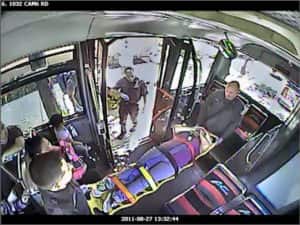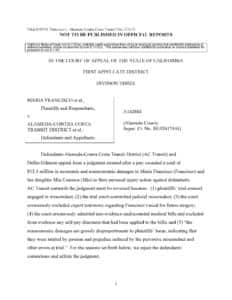 The California Court of Appeal has upheld a $15,313,703 landmark judgment against Alameda-Contra Costa Transit District (“AC Transit”) for Mia and her mother, Maria Francisco who suffered a broken back while riding on a bus being driven recklessly by an AC Transit employee. Plaintiffs were represented on appeal and at trial by Brian Panish, Spencer Lucas and Patrick Gunning of Panish | Shea | Ravipudi LLP LLP. Plaintiffs were also represented on appeal by Margaret M. Grignon of Reed Smith LLP and in the case by Ivan Golde of the Law Offices of Ivan W. Golde.
The California Court of Appeal has upheld a $15,313,703 landmark judgment against Alameda-Contra Costa Transit District (“AC Transit”) for Mia and her mother, Maria Francisco who suffered a broken back while riding on a bus being driven recklessly by an AC Transit employee. Plaintiffs were represented on appeal and at trial by Brian Panish, Spencer Lucas and Patrick Gunning of Panish | Shea | Ravipudi LLP LLP. Plaintiffs were also represented on appeal by Margaret M. Grignon of Reed Smith LLP and in the case by Ivan Golde of the Law Offices of Ivan W. Golde.
“The decision affirming the jury’s verdict will hopefully force AC Transit’s insurance company to do the right thing to pay the judgment in full,” says Mr. Lucas. “Ms. Francisco owes more than $1 million in past medical expenses and is in desperate need of ongoing treatment. This decision will allow her to finally get the treatment she needs.”
On August 27, 2011, Maria Francisco, her daughter and other family members were passengers on an AC Transit bus, traveling to a shopping mall to purchase clothes and a gift for Mia who would be starting preschool. The bus went over a speed hump in a school zone at 30 mph, more than twice the legal speed limit, throwing Ms. Francisco into the air from her metal seat and causing her to land with such extreme force that she suffered a severe traumatic burst fracture to her L1 vertebra. Despite her obvious distress, the AC Transit bus driver began verbally attacking Ms. Francisco in front of her daughter, accusing her of lying about her injury and threatening her with prosecution. The entire incident, including the bus driver’s conduct, was captured on videotape by AC Transit cameras.
As a result of her injury, Ms. Francisco underwent three spinal surgeries, including a spinal fusion, and it would take nearly three years for AC Transit to admit liability.
Throughout the 2014 trial, the public transit agency disputed the necessity of Ms. Francisco’s surgeries and every other aspect of the 21-year-old mother’s damages including her future medical expenses, loss of earnings and pain and suffering, suggesting that she was lying and exaggerating the nature of her injury. The jury disagreed, awarding Ms. Francisco a total of $10,000,000 in past and future pain and suffering, $3,385,965 in past and future medical expenses, $800,266 for future loss of earnings and $127,472 for past family services. Ms. Francisco’s daughter was awarded $1,000,000 for past and future emotional distress relating to her witnessing the incident.
The trial court denied the defendants motion for new trial on July 29, 2014 and an appeal was filed by AC Transit counsel on September 2, 2014.
 On appeal, AC Transit contended the $15,313,703 judgment must be reversed, citing erroneous accusations of “rampant and deliberate misconduct” by plaintiffs’ counsel that deprived defendants of a fair trial. The Court of Appeal disagreed with the defense contentions and found the trial court did not err in determining there was no prejudicial attorney misconduct, noting that, “An attorney does not commit misconduct by questioning the “persuasive force” or merits of the other side’s argument.” The Court of Appeal also disagreed with defense contentions that the trial court engaged in prejudicial judicial misconduct by making several comments that displayed a bias in favor of plaintiffs, including comments the trial court made during the testimony of plaintiff’s expert and improperly “validating” Ms. Francisco’s pain and “bolstering her credibility” by commenting that she appeared uncomfortable while testifying in court, and calling for a short break. As noted by Acting Presiding Justice William McGuiness, “a trial court has the power to ask questions of witnesses to elicit material facts and make comments to clarify testimony.”
On appeal, AC Transit contended the $15,313,703 judgment must be reversed, citing erroneous accusations of “rampant and deliberate misconduct” by plaintiffs’ counsel that deprived defendants of a fair trial. The Court of Appeal disagreed with the defense contentions and found the trial court did not err in determining there was no prejudicial attorney misconduct, noting that, “An attorney does not commit misconduct by questioning the “persuasive force” or merits of the other side’s argument.” The Court of Appeal also disagreed with defense contentions that the trial court engaged in prejudicial judicial misconduct by making several comments that displayed a bias in favor of plaintiffs, including comments the trial court made during the testimony of plaintiff’s expert and improperly “validating” Ms. Francisco’s pain and “bolstering her credibility” by commenting that she appeared uncomfortable while testifying in court, and calling for a short break. As noted by Acting Presiding Justice William McGuiness, “a trial court has the power to ask questions of witnesses to elicit material facts and make comments to clarify testimony.”
Read the Court of Appeal opinion by Acting Presiding Justice William McGuiness.
Additional defense contentions rejected by the Appellate Court include the exclusion of defense counsel’s expert testimony regarding future surgery, the admittance of “undiscounted medical bills” into evidence while excluding any self-pay discounts, and that the jury was influenced because “the noneconomic damages [the jury awarded] are grossly disproportionate to plaintiffs’ harm, indicating that they were tainted by passion and prejudice induced by the pervasive misconduct and other errors at trial.” Of the latter, the Court found there to be sufficient evidence to support the award and affirmed the judgment for both Ms. Francisco and her daughter, Mia.
As such, the Francisco verdict remains the largest known judgment against AC Transit to date.
AC Transit was represented on appeal by Dana Alden Fox, Shawn A. Toliver and Julie M. Azevedo of Lewis Brisbois Bisgaard & Smith LLP as well as Michael G. Yoder and Sabrina Heron Strong of O’Melveny & Myers LLP.
Francisco v. Alameda-Contra Costa Transit District
Court of Appeal of the State of California, First Appellate District, Division Thee
Case No. RG12-617444
Read the Northern California Record report here.